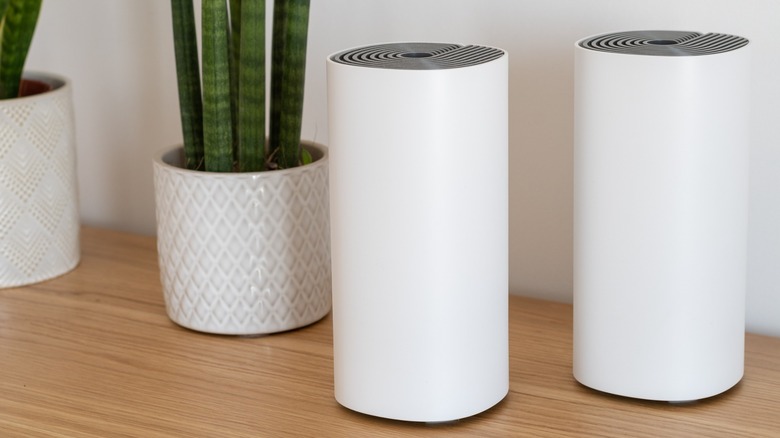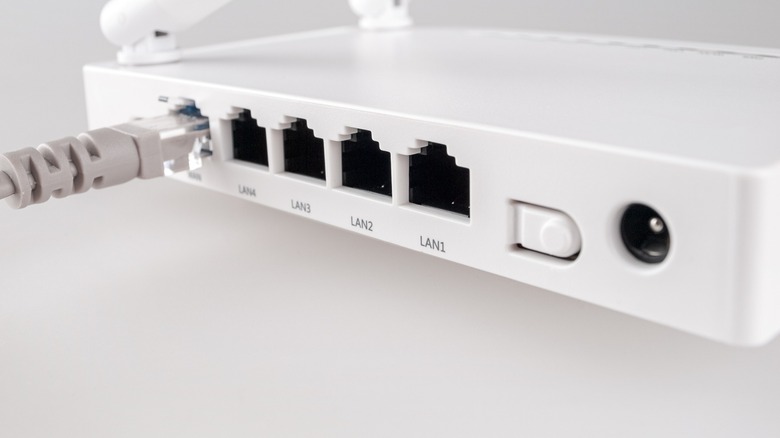Are Wi-Fi Mesh Systems Good For Gaming? Here's What To Know
We may receive a commission on purchases made from links.
The online gaming experience can be marred by three things: poor sportsmanship, cheaters, and a subpar Wi-Fi connection. While there's not much you can do about the first two, there are some avenues that can help fix unstable Wi-Fi. Removing the number of devices connected to your home Wi-Fi and increasing your speed through your internet service provider (ISP) are common fixes, but what about a Wi-Fi mesh system?
You may have seen articles touting how a Wi-Fi mesh system can improve the quality of online gaming. They talk about how these mesh systems ensure that every part of your house will receive a signal that is both stable and strong. However, that's not the full picture. The reality is, for many gamers, a wireless mesh system isn't going to do anything of substance. Wi-Fi mesh systems don't fix a signal; they simply expand it, helping you seamlessly distribute your wireless signal to parts of your home it otherwise can't reach.
Whatever you're getting from your ISP, the mesh system will expand it throughout your home, blanketing it to cover any dead zones. Since it doesn't boost a signal, a Wi-Fi mesh system may have virtually no effect on your online gaming experience, unless a Wi-Fi blind spot is your issue.
Will a Wi-Fi mesh system disrupt online gaming?
With your standard Wi-Fi connection, the signal goes from your router directly to your devices. When you replace your current router with a Wi-Fi mesh system, it adds access points around your home that help expand the range of your network. That may bring up concerns of a weakened signal as the access points get further and further away from the source of the wireless connection. With a weakened signal, your online gaming is sure to suffer.
Thankfully, just as they may have no benefit to the online experience, mesh systems also don't have a negative impact. An item that would degrade the quality of your signal is a Wi-Fi extender. Whereas mesh systems use nodes throughout your home to simply distribute the original signal without reducing its strength, extenders take the signal, fraction it, create a secondary network profile, and send it through your home. The result is a weaker signal that can directly impact how your online games run.
Though Wi-Fi mesh systems are more efficient than extenders, they're also significantly more expensive. One of the best Wi-Fi mesh system brands available is TP-Link, with prices that can run from around $300 or more for a whole-home system. Alternatively, you can grab TP-Link's AC1200 Wi-Fi Extender for less than $50.
How can I reduce lag in my online games?
How can you deal with lag in your online gaming if distance from your router isn't the issue? The first thing you should do is check the speed and integrity of your wireless signal using SpeedTest.net. The download speed should match or come close to what you're paying for through your ISP. If it doesn't, you'll need to contact your provider to ensure the signal being sent to your house isn't degraded.
Other common issues that can result in lag include trying to game over a VPN and connecting to an overloaded network. While VPNs are great for hiding your digital identity, they can cause significant slowdowns. The same kind of slowdown can occur if your network is overburdened. In a home with many Wi-Fi-enabled devices, like smart bulbs and mobile phones, your wireless signal can get weaker. A weaker signal is going to have a negative impact on your online gaming. For the best speed, ditch the wireless connection entirely, and connect your gaming device directly to your router via an Ethernet cable.
If the signal looks fine and you're gaming on a PC, ensure there aren't too many programs running on your computer. Every game requires a certain amount of memory, or RAM, which other programs also eat up when they're running. Trying to run a game on too little RAM will result in a laggy and broken experience. Close some background programs or restart your computer to free up some RAM for gaming.


